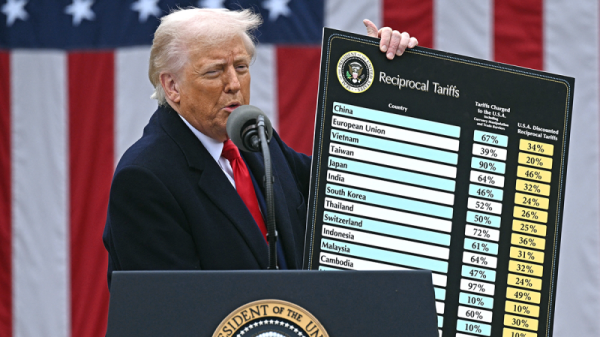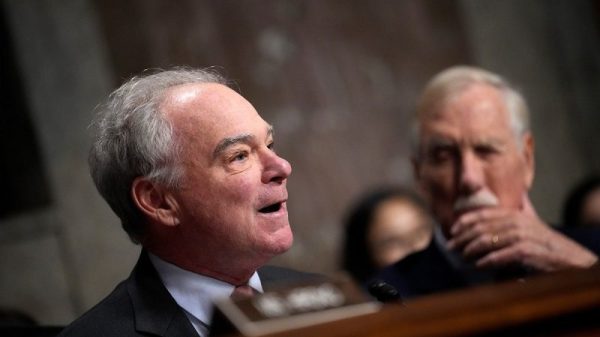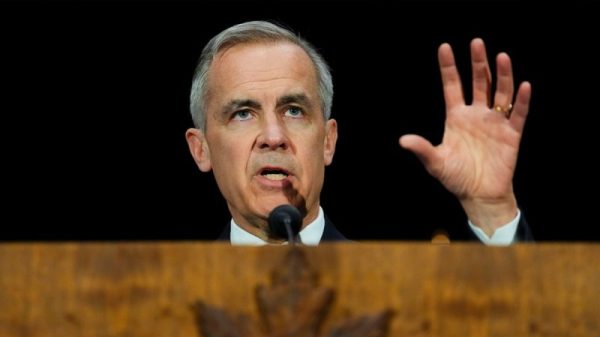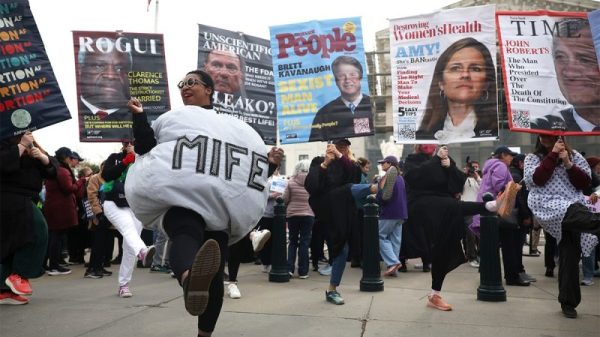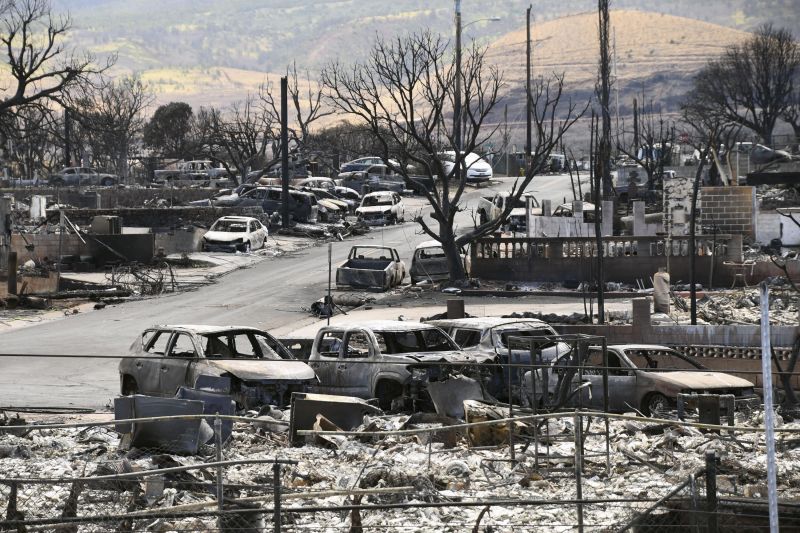For years, the fight against climate change has been symbolized by one number: 1.5.
Ever since countries agreed in 2015 to an ambition of restricting global warming to 1.5 degrees Celsius above pre-industrial levels, the number has become synonymous with staving off catastrophic climate change.
But what if the battle to keep global warming from overshooting this limit has already been lost?
Some prominent scientists argue it has and it’s irresponsible to sugarcoat the truth. For others, that view is not only wrong, but even “dangerous.”
It was the renowned climate scientist James Hansen whose comments fueled the debate. In November, he declared the 1.5 degree-limit “deader than a doornail,” saying it was a shortcoming of the scientific community “to not make clear to the political leaders what the situation is.”
The rate of global warming is accelerating, he said at a news conference in November, and the world is certain to blow past 1.5 degrees of warming. “Anybody who understands the physics knows that.”
Hansen’s words have heft — he is widely credited as the first scientist to publicly sound the alarm on climate change in the 1980s. But other scientists have pushed back hard.
The response from Friederike Otto, a climate scientist at Imperial College London’s Grantham Institute, was even blunter. “I think that’s a very stupid thing to say,” she told reporters in November. “At the moment, (1.5 degrees) is within reach and to pretend it’s not will just lead to doing nothing even longer.”
Disagreements over climate science are not uncommon — our planet is a highly complex system, and the nature of reaching consensus typically starts with scientists who disagree.
But as global warming fuels extreme weather — like heat waves, cyclones and even fierce winter storms, such as those that have torn through parts of the United States — the debate over the future of 1.5 is getting unusually heated.
Extraordinary heat
As many parts of the US and Europe deal with an Arctic blast of brutally cold air, it can be hard to recall just how hot 2023 was. Last year saw unprecedented global temperatures, with heat records around the world tumbling.
El Niño — a natural climate phenomenon that tends to boost the planet’s average temperature — collided with the long-term trend of global warming, making 2023 the hottest year on record. The year came within a whisker of breaching 1.5 degrees, according to data from the Copernicus Climate Change Service.
While scientists are most concerned about long-term warming over many years, not just one, 2023’s record heat was a stark warning sign. If the world breaches 1.5 degrees over the long term, scientists say the impacts of climate change will start to exceed the ability of humans and ecosystems to adapt.
But every fraction of a degree matters, and climate chaos is already emerging.
Over just a few years, the world has warmed from 1 degree Celsius above pre-industrial levels to around 1.2 degrees today — fractions of a degree that have translated to record breaking extreme weather.
He predicts that by May, the planet will have experienced a 12-month period with an average temperature 1.6 to 1.7 degrees higher than pre-industrial levels.
“For all practical purposes we are only going to be looking at 1.5 degrees in the rearview mirror,” he said.
Is climate change accelerating?
At the center of Hansen’s argument is his much-debated assertion that the planet is warming much faster than predicted.
He points to the imbalance between the energy coming in from the sun and what leaves through heat radiating into space. This imbalance has doubled, meaning global warming is escalating, he argued in a November paper he co-authored with more than a dozen other scientists.
The paper’s scientists attribute this mainly to successful global efforts to tackle shipping pollution.
Ships burn fossil fuels that produce carbon emissions, which have a significant impact on global warming. But ships’ exhaust fumes also contain sulfur dioxide. In what may seem a strange twist, the pollutant – which is highly hazardous for human health – has a global cooling impact, as the particles reflect sunlight away from the Earth.
Hansen’s research predicts the world will breach the long-term 1.5-degree benchmark this decade, and 2 degrees before 2050. That would mean the world has failed to deliver on the central goal in the Paris Agreement on climate change, under which countries pledged to limit warming to well below 2 degrees.
Bill McGuire, emeritus professor of Earth sciences at University College London, shares Hansen’s concerns about the pace of change.
But for many other scientists, there simply isn’t the evidence to say global warming is speeding up. At least not yet.
Last year’s unprecedented heat was boosted by El Niño, Mann said, and “does not constitute a change in the trend line.”
The rate of global warming did accelerate after the 1970s as clean air laws reduced air pollution, but since then, “the planet has warmed at a roughly constant rate,” he said. The reality is bad enough, he added. “There is no need to exaggerate.”
Samantha Burgess, deputy director of Copernicus, said there have been recent climate events that scientists are struggling to understand, including 2023’s record-shattering ocean temperatures.
But in terms of Hansen’s warning about the significant impacts on global warming of cleaning up shipping pollution, “we don’t see the signal,” she said.
Why 1.5 matters
Few scientists will dispute that the world faces a daunting path to limit warming to 1.5 degrees. Even with current climate policies, the planet is on course for nearly 3 degrees of warming.
In some ways, the split between them is, at its heart, a debate about the value of having the 1.5 degree limit in the first place.
If we say 1.5 degrees is dead, Otto said, “that means, for a lot of people, probably the conclusion is, ‘OK, then it’s not even worth trying.’”
Smith said it risks playing into a “fatalistic narrative that is actually quite dangerous,” potentially persuading leaders to think “we’ve failed, anything goes now.”
Mann said it was “irresponsible” to claim 1.5 degrees is dead when the world can avoid crossing the threshold by making substantial and immediate reductions in carbon pollution.
McGuire takes the opposite view. There is no feasible way the world can meet this limit which would require nearly halving emissions by 2030, he said. “To suggest otherwise is duplicitous and presents a false picture of where we are.” Framing 1.5 as a “target” to be reached, rather than a limit to stay under, has given the illusion we have more time than we do to tackle the crisis, he said, and has allowed countries and companies keep burning fossil fuels.
But one major concern is that if politicians abandon 1.5 degrees, they won’t strive to restrict global warming to 1.6 or 1.7 degrees, but will instead focus on 2 degrees — the upper limit countries committed to in the 2015 Paris Agreement.
“That is a huge danger, and that would really be catastrophic,” said Otto.
Between 1.5 and 2 degrees lies disaster: The risk of triggering a slew of climate tipping points, including ice sheet melting and mass coral reef death, and the lives and livelihoods of millions of people.
We will reach 1.5 degrees as a global average temperature, probably next year, Otto said. “Whether we stay there, or how much we go above that, really is still a political question and it is in our gift to change that.”











